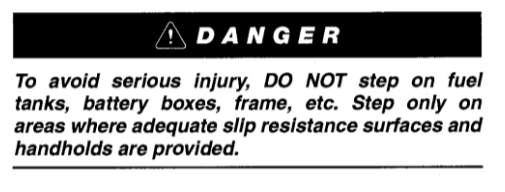Mack | 2000 Maintenance and Lubrication for Mack Diesel Powered Trucks - Daily Inspection Checklist
Use this checklist for the maintenance of your Mack truck. Maintenance checklists have proven to reduce repair costs for trucks and to avoid unnecessary damages.
Mack | 2000 Maintenance and Lubrication for Mack Diesel Powered Trucks - Daily Inspection Checklist
Use this checklist for the maintenance of your Mack truck. Maintenance checklists have proven to reduce repair costs for trucks and to avoid unnecessary damages.
Driver's Daily Inspection
General Appearance
Check the overall condition of the vehicle. Look for signs of leaking fuel, oil, or coolant.
Check to see if the chassis is leaning (flat tires, broken springs, etc.)
Review the previous chassis inspection sheets. Make sure any reported defects were corrected.
Raise the hood/Title the cab
Check the windshield washer reservoir. Add washer solvent if necessary.
Radiator
Check the coolant level and add a 40% to 60% mix of antifreeze/water if necessary
Check for coolant leaks
Check the condition of radiator and heater hoses
Clean debris from grille area.
Engine
Check crankcase oil level and add recommended engine oil if necessary.
Check condition of all engine drive belts
Check for oil, fuel and air leaks.
Check engine and chassis wiring harnesses for frayed or broken wires.
Steering System
Check power steering fluid level and add recommended fluid if necessary.
Check security of steering gear, pitman arm, and drag link,.
Check steering shaft U-joints for tightness, cracks, and damage
Close hood/Lower cab; Secure latches
Cab exterior
Check condition of wheels and tires. lnspect each tire for cuts, leaks, punctures, bulges, abnormal wear, and tire match
Check rims for damage and wheel nut tightness. Rust streaks around wheel nut ball seats are an indication of looseness
Check tire pressure while tires are cold
Check oil level of front wheel bearings. Add oil if necessary
Check brake system components
Check electrolyte level in babery and add distilled water if neces- sary. If the battery is a maintenance-free type, check state of charge indicator. Check the battery cables for condition, chafing, and proper routing
Check condition of fuel tanks and fuel hoses, connectors and pipes
Inspect air intake for secure mounting, leaks, or damage. Replace air cleaner element if indicator locks in the red zone or dash-mounted gauge indicates inlet restriction of 20 inches (510 mm) of water for applicable engine
Clean headlamps, exterior windows, and mirrors,. Check windshield and mirrors for cracks. Check operation of all lamps and inspect lenses. Repair any non-operating lamps and replace any broken lenses.
Climb into Cab
Cab Interior
Clean interior windows and dash gauges.
Check seatbelts for security and damage
Secure any loose items found in the cab.
Check emergency equipment and warning devices
Adjust driver's seat and rearview mirrors
Check clitch pedal free-play
Start the engine
Listen to any unusual noises.
Make sure the alarms shut off when oil pressure, air pressure, etc., reach normal operating range.
Check operation of horns (both air and electric), windshield wipers and washers, heater and defroster, back-up alarm, and, if so requipped, heated mirrors.
Check operation of service brakes
Check application of parking brakes
Observe instruments and verify readings
End of the day
Apply parking brakes, block tires, and completely drain air system
Drain water from fuel separator
Check for fuel, oil and coolant leaks
Source: MaintainX (Community Member)

